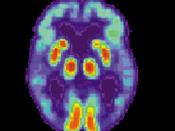Nicotine and the Brain
One of the main ingredients in tobacco has grabbed scientists' attention. A number of studies are showing that the chemical nicotine can trigger a slew of brain mechanisms. Many appear to be positive. Researchers now are weeding out nicotine's behavioral, cognitive and addictive actions and testing nicotine-like drugs that may address some of today's major health problems.
Puff. Puff. Puff. A brew of chemicals enters the body through a cloud of cigarette smoke.
It's known that some of these chemicals ravage the body. Prime ingredients such as tars and carbon monoxide are instigators of cardiovascular diseases and lung ailments. The cigarette's third main component, nicotine, affects the heart, lungs and stomach during its internal travels.
Nicotine, however, doesn't stop there. Starting in the l980s researchers unearthed definitive evidence that this chemical also affects the brain. Today several studies show that nicotine, which can act as either a stimulant or depressant depending on dose and history of use, launches a number of surprisingly different brain mechanisms.
And some are beneficial.
Nicotine's two-faced qualities range from boosting memory to promoting the addiction process.
The new understanding is leading to:
÷Potent compounds that potentially could bypass the chemical's negative qualities and aid in the treatment of health problems.
÷A clearer picture of why it is so difficult to stop smoking.
Nicotine activates a multitude of brain mechanisms by attaching to specific proteins, known as receptors, which are found on the surface of nerve cells. This interaction leads to the transmission of a chemical message. Nicotine receptors flourish in many areas of the central nervous system and diverse structural variations exist between different nicotine receptor types. Nicotine can exert dramatically different actions depending on the location and type of receptor it sticks to.
Today scientists are conducting research to track...



Looks like he's a specialist...
...on this topic of biological science, as the whole style of his article reflects his skills.
5 out of 5 people found this comment useful.